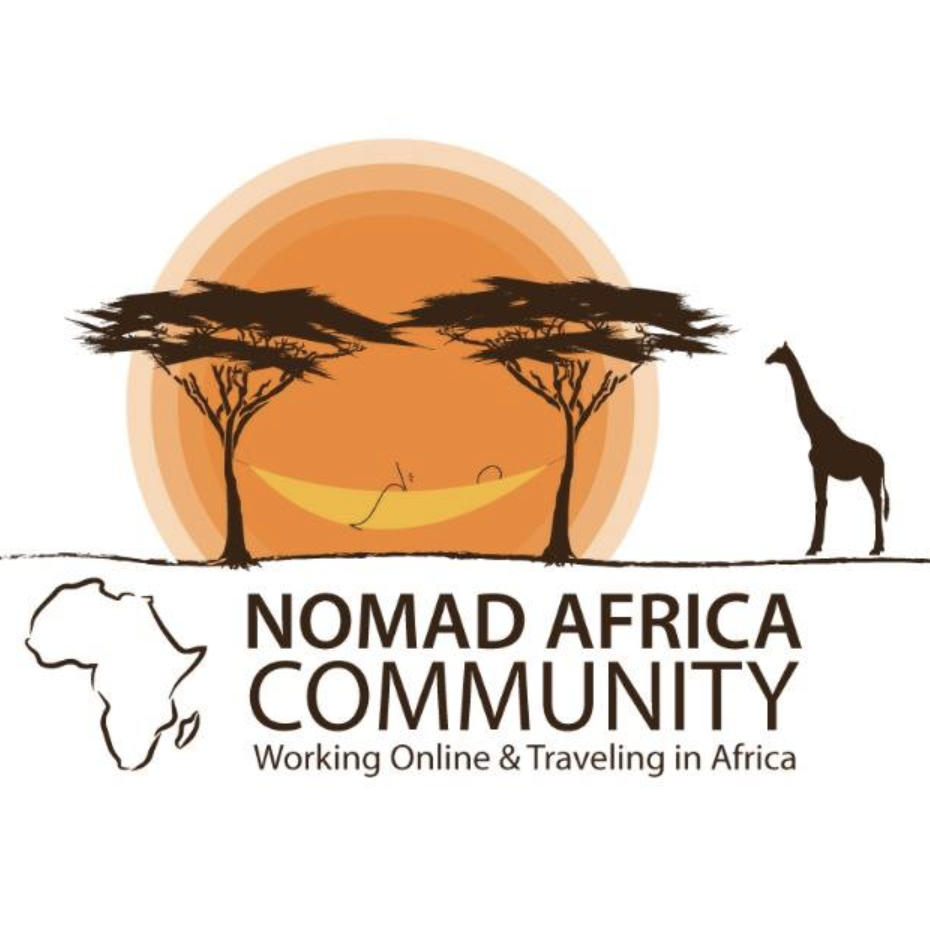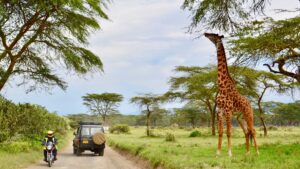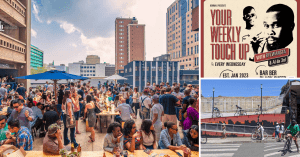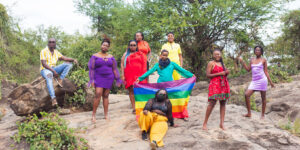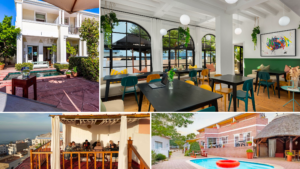Imagine working online in a country where you can witness the beauty of nature, the richness of culture and the warmth of people. That’s Uganda, a hidden gem in East Africa that has something for everyone. Whether you want to explore the wildlife of Kidepo National Park, relax by the shores of Lake Victoria or mingle with the locals, you can find your ideal co-working space in Uganda.
Uganda is also a paradise for food lovers, with its diverse and fresh cuisine that will tantalize your taste buds. In this guide, we will share with you some of the best places to eat and visit while you enjoy your digital nomad lifestyle in Uganda.
This is a quick guide that will show you how to make the most of your remote work experience in Uganda.
Jump To:
Things to Do in Uganda | Destinations | Internet | Coworking Spaces | Coliving Spaces | Best Times to Visit | Visas | Cost of Living | How to Get There | Safety and Security
| Main Languages | English (Official), Swahili, Luganda |
| Capital city | Kampala |
| Main airport(s) | Entebbe International Airport |
| Currency | Ugandan Shilling (UGX) |
| Time Zone | East Africa Time (EAT, GMT+3) |
| Plug Socket Type | Type G |
| Best time(s) to Visit | December to February and June to August |
| Internet Quality | Good |
| Highlights | Diverse Wildlife; Mountain Gorilla Tracking; Rwenzori Mountains Hiking |
Things to Do in Uganda
Uganda is a country that is rich in culture and natural beauty. It offers a wide range of activities for digital nomads to experience during their stay. Here are a few things to do in Uganda:
Travel
- Visit the Bwindi Impenetrable Forest for gorilla trekking. This is one of the most popular activities in Uganda and definitely worth the experience.
- Take a boat ride on the Nile River. The Nile is the longest river in the world and it is a great way to experience the beauty of Uganda.
- Explore the Rwenzori Mountains. These mountains are also known as the “Mountains of the Moon” and offer a challenging trek for those who are up for it.
Markets
- Visit the Nakasero Market in Kampala. This market is the largest in the city and offers a wide range of goods from fresh produce to clothing.
- Check out the Owino Market in Kampala. This market is known for its second-hand clothing and is a great place to find unique items at a bargain price.
- Explore the crafts market in Entebbe. This market offers a wide range of handmade crafts that make great souvenirs to take home.
Overall, Uganda offers a unique experience for digital nomads looking to immerse themselves in a new culture and explore the natural beauty of the country.
Best Destinations for Digital Nomads
Uganda is a landlocked country in East Africa that offers a unique experience for digital nomads looking to live and work in Africa. Kampala, the capital city, is a bustling metropolis with a vibrant culture and a growing expat community. Here are some of the best destinations and places to live for digital nomads in Uganda:
Kampala
Kampala is the largest city in Uganda and a great place for digital nomads to live and work. The city has a growing tech scene and a range of co-working spaces, cafes, and restaurants that cater to remote workers. The cost of living in Kampala is relatively low, and there are plenty of affordable accommodation options available. Kampala also has a lively nightlife and a range of cultural attractions, making it an excellent destination for those looking to explore Africa.
Read More>>> Kampala for Digital Nomads
Jinja
Jinja is a small town located on the shores of Lake Victoria, just a few hours’ drive from Kampala. The town is known as the adventure capital of East Africa and is a popular destination for outdoor enthusiasts. Jinja offers a range of activities, including white-water rafting, bungee jumping, and kayaking. The town also has a growing expat community and a range of accommodation options for digital nomads.
Entebbe
Entebbe is a small town located on the shores of Lake Victoria, just a short drive from Kampala. The town is home to Uganda’s only international airport and is a popular destination for expats and digital nomads. Entebbe has a range of accommodation options, including serviced apartments and guesthouses. The town also has a range of restaurants and cafes that cater to remote workers.
Other Destinations
While Kampala, Jinja, and Entebbe are the most popular destinations for digital nomads in Uganda, there are other places worth considering. For example, Tanzania is just a short flight away and offers a range of opportunities for digital nomads. There are also a range of national parks and wildlife reserves in Uganda that are worth visiting.
Overall, Uganda offers a range of destinations and places to live for digital nomads. Whether you’re looking for a bustling city or a quiet town, Uganda has something to offer. With a low cost of living, friendly locals, and a range of accommodation options, Uganda is an excellent destination for remote workers looking to experience Africa.
Internet Connectivity
As a digital nomad in Uganda, having reliable internet connectivity is crucial. Fortunately, there are several options available to access the internet in Uganda.
Mobile Data
Mobile data is the most common way to access the internet in Uganda. The major mobile network providers are MTN, Airtel, and Africell. They offer various data plans with different speeds and prices. It is recommended to buy a SIM card from one of these providers and top up with data bundles as needed. However, it is important to note that the internet speed can be slow and inconsistent, especially in rural areas.
Wi-Fi
Most hotels, cafes, and co-working spaces in major cities like Kampala offer Wi-Fi to their customers. The quality and speed of the Wi-Fi can vary, so it is recommended to ask for the Wi-Fi password and test the connection before committing to a place to work. Some co-working spaces offer dedicated high-speed internet connections for digital nomads, but they can be more expensive than other options.
Fixed Broadband
Fixed broadband is available in some areas of Uganda, but it is not as widespread as mobile data. The major fixed broadband providers are Liquid Telecom and Smile Communications. They offer various packages with different speeds and prices. However, the installation fees can be expensive, and the coverage is limited to major cities and towns.
In summary, mobile data is the most common and convenient way to access the internet in Uganda, but the speed and consistency can be a challenge. Wi-Fi is available in many places, but the quality and speed can vary. Fixed broadband is an option in some areas, but it can be expensive and limited in coverage. It is recommended to have a backup plan and test the internet connection before committing to a place to work.
Coworking Spaces
As a digital nomad in Uganda, you’ll need a workspace that is both comfortable and productive. Fortunately, there are several coworking spaces in Uganda that cater to the needs of digital nomads.
Hive Colab
Hive Colab is a popular coworking space located in Kampala. It offers a range of amenities, including high-speed internet, printing and scanning services, and private meeting rooms. This coworking space is perfect for digital nomads who need a quiet and professional environment to work in.
Outbox Hub
Outbox Hub is another popular coworking space in Kampala. It offers a range of amenities, including high-speed internet, printing and scanning services, and private meeting rooms. This coworking space is perfect for digital nomads who need a creative and collaborative environment to work in.
At The Hub Kampala Kamwokya
At The Hub Kampala Kamwokya is a coworking space located in the heart of Kampala. It offers a range of amenities, including high-speed internet, printing and scanning services, and private meeting rooms. This coworking space is perfect for digital nomads who need a central location to work from.
Stays for Digital Nomads
If you’re a digital nomad who needs a place to stay while working in Uganda, there are several options available. Nomad Stays offers a range of coworking and coliving spaces that cater to the needs of digital nomads. These spaces offer comfortable accommodation, high-speed internet, and a range of amenities to help you stay productive while working remotely.
In conclusion, Uganda has several coworking spaces that cater to the needs of digital nomads. Whether you need a quiet and professional environment or a creative and collaborative space, there is a coworking space in Uganda that will meet your needs. Additionally, if you need a place to stay while working in Uganda, there are several coworking and coliving spaces available that offer comfortable accommodation and a range of amenities to help you stay productive while working remotely.
Coliving Spaces
As a digital nomad in Uganda, finding a comfortable and affordable place to stay is crucial. Luckily, there are several coliving spaces available in Uganda that cater to the needs of digital nomads.
Coliving spaces are a great option for digital nomads who want to live and work with like-minded individuals. These spaces usually offer a combination of private and shared accommodation, as well as coworking spaces, communal areas, and other amenities.
Here are some of the best coliving spaces in Uganda for digital nomads:
-
Nomad Stays Uganda – Nomad Stays is a platform that connects digital nomads with affordable accommodation options in Uganda. They offer a range of coliving spaces in Kampala and other parts of the country, with prices starting from as low as $379 per month.
-
Outsite Uganda – Outsite is a coliving and coworking space that offers private rooms, shared rooms, and apartments. They have a location in Kampala, which is perfect for digital nomads who want to be in the heart of the city.
-
The Hive Coliving – The Hive is a coliving space located in Entebbe, which is a popular tourist destination in Uganda. They offer private rooms, shared rooms, and apartments, as well as coworking spaces and communal areas.
-
Kafunda Kreative – Kafunda Kreative is a coliving and coworking space located in Jinja, which is known as the adventure capital of Uganda. They offer private rooms, shared rooms, and apartments, as well as a coworking space and a communal kitchen.
Overall, coliving spaces are a great option for digital nomads who want to live and work in Uganda. They offer affordable accommodation, a sense of community, and all the amenities you need to be productive and comfortable.
Best Times to Visit
Uganda is a beautiful country with a diverse range of landscapes and experiences to offer. If you’re a digital nomad planning a trip to Uganda, it’s important to know the best times to visit to make the most of your experience.
The best time to visit Uganda is during the dry seasons, which are between December and February, and between June and August. During these months, the weather is ideal for trekking to see mountain gorillas and chimpanzees, as well as game spotting in national parks. The dry seasons offer the best conditions for wildlife viewing, and primate walks in the forest are a big part of any safari in Uganda.
The temperature in Uganda remains relatively constant throughout the year, with average temperatures ranging from 21°C to 27°C (70°F to 81°F). However, it’s important to note that temperatures can vary depending on the altitude and location.
Worst Times to Visit
The worst time to visit Uganda is during the rainy season, which occurs between March and May, and between September and November. During these months, the weather can be unpredictable, and heavy rainfall can make travel difficult.
If you’re planning to visit Uganda during the rainy season, it’s important to be prepared for wet conditions and plan accordingly. While the rainy season can make travel more challenging, it can also be a great time to visit for birdwatching and other activities that are better suited to wet weather.
In summary, the best time to visit Uganda for digital nomads is during the dry seasons, between December and February, and between June and August. However, with the right preparation, it’s possible to enjoy Uganda’s beauty and experiences year-round.
Tourist and Digital Nomad Visas
Uganda offers a variety of visa options for tourists and digital nomads alike. Here are some of the most common options:
-
Tourist Visa: This visa is valid for up to 90 days and is suitable for those who are visiting Uganda for leisure or tourism purposes. The cost of a single-entry tourist visa is $50, while a multiple-entry visa costs $100.
-
Business Visa: This visa is suitable for those who are traveling to Uganda for business purposes. It is also valid for up to 90 days and costs $50 for a single-entry visa and $100 for a multiple-entry visa.
-
Work Permit: If you plan to work in Uganda, you will need a work permit. This permit is valid for up to two years and can be renewed. The cost of a work permit varies depending on the type of work you will be doing.
-
Residence Permit: If you plan to stay in Uganda for an extended period, you may apply for a residence permit. This permit is valid for up to two years and can be renewed. The cost of a residence permit varies depending on the type of permit you are applying for.
-
Digital Nomad Visa: Uganda does not currently offer a specific digital nomad visa. However, as a digital nomad, you may apply for a work permit or residence permit, depending on your situation.
It’s important to note that visa requirements and costs can change at any time, so it’s best to check with the Ugandan embassy or consulate in your home country for the most up-to-date information. Additionally, it’s recommended to apply for your visa well in advance of your trip to avoid any potential delays or issues.
Cost of Living
Uganda is known for its low cost of living, making it an attractive destination for digital nomads looking to save money. The cost of living in Uganda is significantly lower than in many other countries, and digital nomads can live comfortably on a modest budget.
Accommodation
Accommodation in Uganda is relatively affordable, with options ranging from budget-friendly hostels to more luxurious apartments. A digital nomad can expect to pay between $300 to $500 per month for a comfortable apartment in Kampala, the capital city of Uganda.
Food and Drink
Food and drink in Uganda are also affordable, with local markets offering fresh produce at very low prices. A meal at a local restaurant can cost as little as $2.5, while a bottle of beer costs around $1.1. Coffee is also relatively cheap, with a cup of coffee costing around $0.8.
Transportation
Transportation in Uganda is also very affordable, with public transportation options such as buses and taxis being the most popular. A taxi ride across the city can cost as little as $3, while a bus ride costs around $0.5.
Other Expenses
Other expenses in Uganda, such as healthcare and entertainment, are also relatively affordable. A visit to a doctor can cost as little as $10, while a movie ticket costs around $4.
Overall, Uganda offers a low cost of living, making it an attractive destination for digital nomads looking to save money while still enjoying a high quality of life.
How to Get There
Uganda is a landlocked country in East Africa, bordered by Kenya, Tanzania, Rwanda, South Sudan, and the Democratic Republic of the Congo. The most common way to get to Uganda is by air, and the main international airport is Entebbe International Airport (EBB), located about 35 kilometers from the capital city, Kampala.
Several airlines operate flights to Entebbe International Airport from various parts of the world, including Africa, Europe, the Middle East, and Asia. Some of the popular airlines that fly to Entebbe include Emirates, Ethiopian Airlines, British Airways, Turkish Airlines, KLM, and Qatar Airways.
Once you arrive at Entebbe International Airport, you can take a taxi or a private car to Kampala, which is about a 45-minute drive away. Alternatively, you can take a shuttle bus, which is a more affordable option, but it may take longer, depending on traffic.
If you are traveling from neighboring countries, you can also enter Uganda by road. There are several border crossings between Uganda and its neighboring countries, including Kenya, Tanzania, Rwanda, South Sudan, and the Democratic Republic of the Congo. However, it is important to note that some of the border crossings may be closed or have limited hours of operation, so it is advisable to check beforehand.
Overall, getting to Uganda is relatively easy, and there are several options available, depending on where you are coming from. Whether you are flying in or entering by road, be sure to have all the necessary travel documents, such as a valid passport and visa, if required.
Safety and Security
Uganda is a relatively safe country for digital nomads, but it is important to take the usual precautions to be aware of your surroundings, protect your valuables, and keep a low profile. Crime does occur, particularly in urban areas, so it is important to stay vigilant. Here are some tips to help you stay safe and secure in Uganda:
- Avoid walking alone at night, especially in poorly lit areas.
- Keep your valuables out of sight and be aware of pickpockets in crowded areas.
- Be cautious when using public transportation, particularly matatus (minibuses), which can be overcrowded and unsafe.
- If you are driving, be aware that traffic can be chaotic and unpredictable, and roads can be in poor condition.
- Be cautious when using ATMs, and avoid withdrawing large sums of money in public.
- Be aware of the risk of terrorism, particularly in the border regions with South Sudan and the Democratic Republic of Congo.
It is also important to be aware of the risk of diseases such as malaria and yellow fever in Uganda. Make sure you are up-to-date on your vaccinations and take appropriate precautions to avoid mosquito bites.
Overall, with common sense and caution, digital nomads can enjoy a safe and secure experience in Uganda.
Conclusion
In conclusion, Uganda is a great destination for digital nomads. With its low cost of living, friendly locals, and beautiful scenery, it is no wonder that more and more people are choosing to work and live in Uganda.
Some of the most popular cities for digital nomads in Uganda are Kampala, Entebbe, and Jinja. Each of these cities has its own unique charm and attractions, making it easy to find a place that suits your needs and preferences.
When it comes to finding accommodation in Uganda, there are plenty of options available, from budget-friendly hostels and guesthouses to more luxurious hotels and apartments. It is important to do your research and choose a place that is safe, comfortable, and convenient for your needs.
In terms of connectivity, Uganda has a reliable and fast internet network, making it easy to stay connected and get work done. Additionally, there are plenty of coworking spaces and cafes that cater to digital nomads, providing a comfortable and productive work environment.
Overall, Uganda is a fantastic destination for digital nomads who are looking for an affordable, welcoming, and beautiful place to live and work. With its vibrant culture, stunning landscapes, and friendly people, it is easy to see why so many people are choosing to make Uganda their home away from home.
